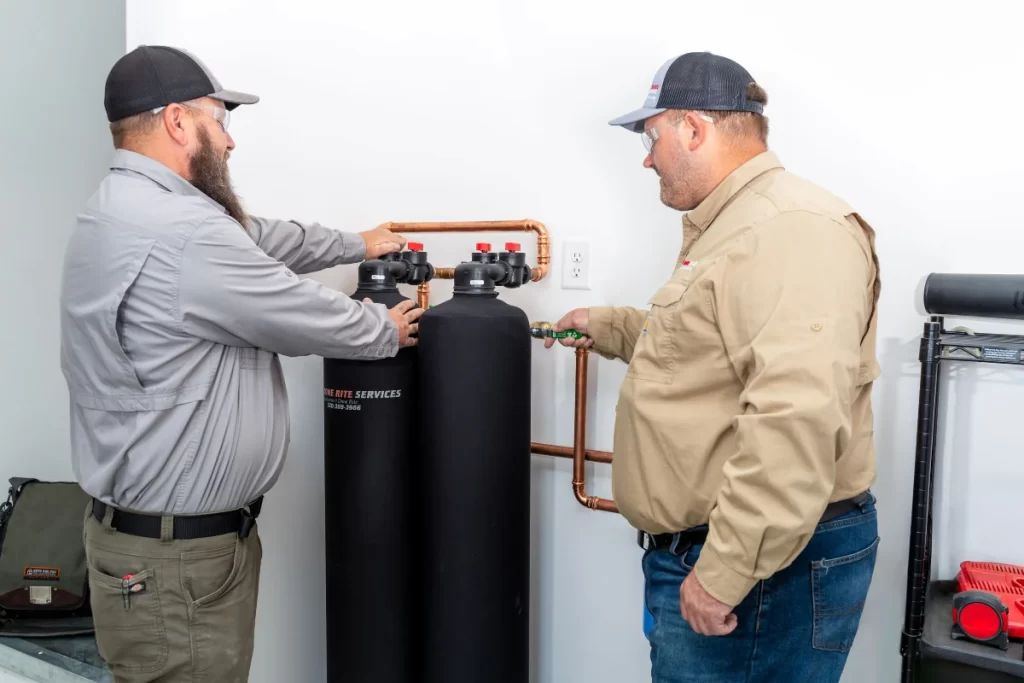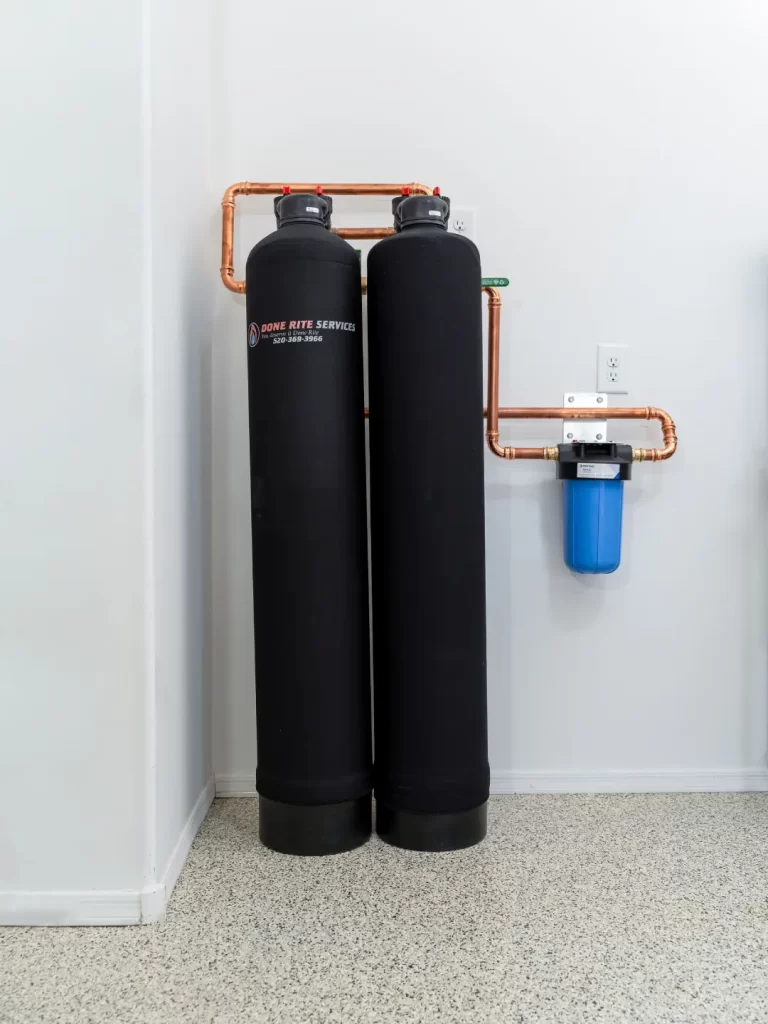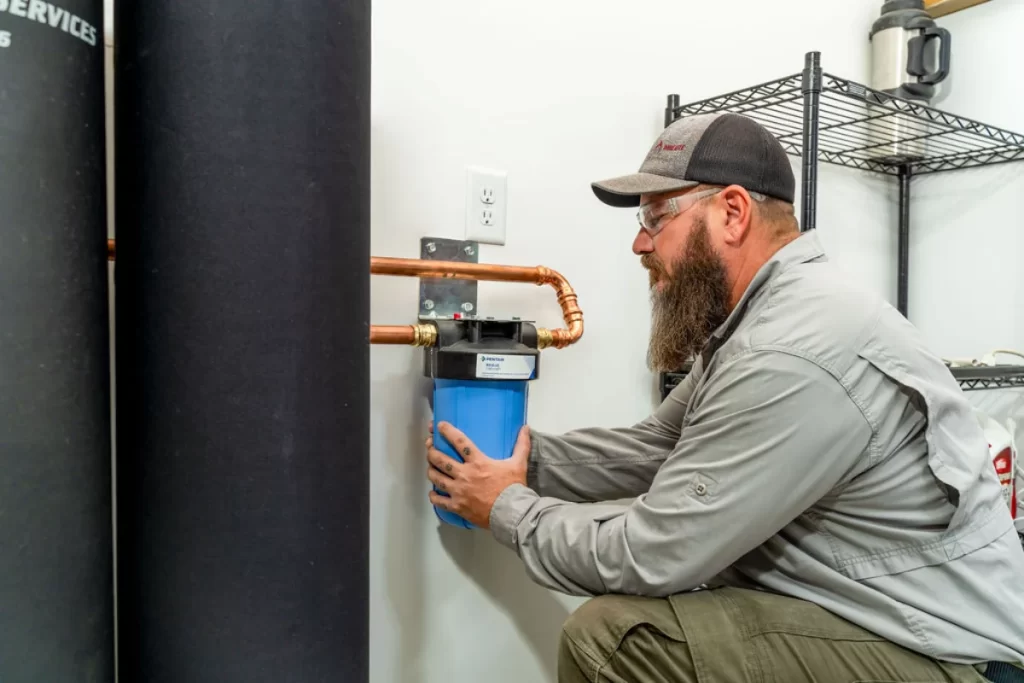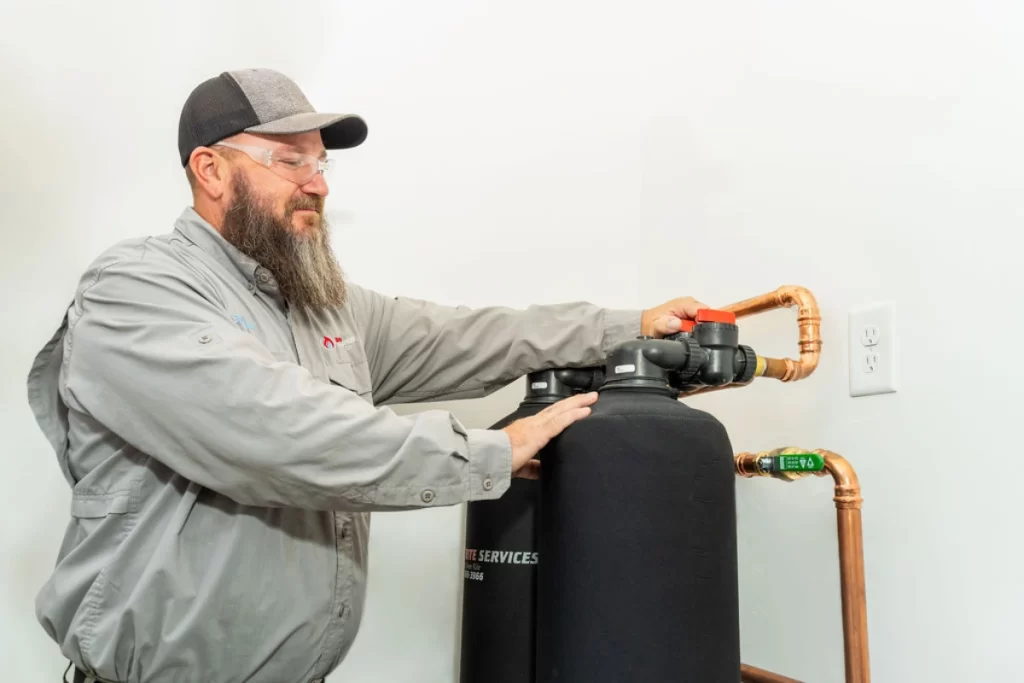
In Tucson, Arizona, where water hardness can be a common problem for many homeowners, installing a water softening system can make your quality of life much better. A water softener is a device that is an important part of your water system, ensuring the longevity of plumbing, efficiency of water-using appliances and your overall comfort in the home.
If you’re on the fence about installing a water softener for home use, in this complete breakdown we will answer common questions such as: What is a water softener? How does a water softener work? and much more – to help you make an informed decision.
To find the best water softener solution for your Tucson Home, contact Done Rite Services today or give us a call at 520-369-3966.
Table of Contents
The Basics of Water Softening – What is a Water Softener?
Water softening is the process of removing minerals like calcium and magnesium from water. These minerals cause water hardness, leading to various issues including itchy skin after taking a shower, damage to your plumbing system and can make even simple things such as keeping your glassware clean without water spots a difficult task – also the Tucson area in general has been known to have issues with water quality.
A home water softener system typically uses a process called ion exchange to remove these minerals, making the water softer and more suitable for use in homes and helps with water quality in general.
What Does a Water Softener Do?
So, what does a water softener do? The primary role of a water softener in your home is to prevent the scaling that hard water causes. This scaling can clog pipes, reduce the efficiency of water heaters, and leave spots on dishes and fixtures.
By installing a water softener system for the house, you can protect your plumbing and appliances from these damaging effects. The damage that hard water can do to your plumbing over time can turn into a very expensive problem to fix and is far more expensive in the long run than implementing a system for water softening. For additional plumbing support, consider our reliable toilet repair and replacement.
How Do Water Softeners Work?
So how do water softeners work? These systems function by a process known as ion exchange. Inside a water softener, there are resin beads that hold sodium ions. When hard water, which is high in minerals like calcium and magnesium, flows through these beads, a reaction happens.
The resin beads bind to the calcium as well as magnesium ions and replace them with sodium ions. This process is efficient and continues until the resin beads are saturated with calcium and magnesium.
At this point, the system undergoes a regeneration cycle. During regeneration, a strong brine solution flushes through the resin tank, bathing the beads in a high concentration of sodium ions.
These sodium ions effectively push the calcium and magnesium ions off the beads, renewing their ability to soften water. The unwanted minerals are then flushed from the system, leaving the resin beads recharged and ready for more softening action. This cycle is key to ensuring consistent soft water supply in your home.
Types of Water Softening Systems

Tucson homeowners can choose from a variety of water softening systems, each tailored to specific needs and water quality. Beyond the traditional ion-exchange water softeners that use sodium, there are also sodium-free alternatives.
These sodium-free systems use potassium chloride instead, which is an ideal option for those concerned about sodium intake.
Another type to consider is the magnetic or electronic water softener. These systems work by passing water through a magnetic field, which changes the electromagnetic properties of the calcium and magnesium ions so they remain in suspension and don’t form scale.
While they are less conventional than ion-exchange systems and their effectiveness is sometimes debated, they offer a no-salt solution which can be attractive to some homeowners.
Water Softener Service and Repair

Regular water softener service ensures your system operates efficiently. In Tucson, where water conditions can vary, this maintenance is even more important. If you face issues like salt bridges or resin bed problems, seeking professional leaky faucet repair sooner than later to keep the system operating properly is important.
Regular servicing includes checking the salt level in the brine tank, ensuring the resin bed is not compacted, and verifying that all components are functioning correctly. It’s also important to clean the brine tank periodically to prevent salt bridging – a condition where a hard crust forms in the brine tank and prevents proper regeneration.
If you notice changes in water quality, it might signal resin bed issues or mechanical failures depending on the type of system you chose. Resin beads can lose their effectiveness over time or become clogged with iron or other heavy metals.
In such cases, professional repair services will diagnose and rectify these issues, replacing parts if necessary. Timely repairs not only ensure the longevity of the water softening system but also maintain water quality and efficiency.
Benefits of Water Softener in Tucson
There are many benefits of water softener installation in Tucson. Apart from preventing scale buildup, water softeners can enhance the quality of your water for bathing, cleaning, and laundry. They also contribute to longer-lasting appliances and plumbing fixtures.
For ongoing maintenance and advice on keeping your pipes in top shape, Done Rite Services is here to help.
What Does a Water Softener Do for Well Water?
Tucson homeowners wonder what does a water softener do for well water? and do I need one for my water system? Well water often contains higher levels of hardness minerals, making water softeners an essential component for preventing scale and maintaining water quality. For homeowners in specific areas, our Saddlebrooke plumbing services can cater to all your needs.
Choosing the Right Water Softener for Your Home

Selecting the right water softener for your Tucson home involves understanding your water usage and the hardness level of your water. Consider factors like the size of your household, the regeneration method of the softener, and whether you prefer a salt-based or salt-free system.
For Tucson homeowners, grappling with hard water challenges, understanding how a water softener works, the different types of water softeners and what your wants and needs are will help you in making the right decision for your household. With the right water softening system, you will notice the difference, from prolonged appliance life to improved water quality. Whether it’s for standard use or specific needs like well water, a water softener is a valuable investment in your home’s health and efficiency. For any plumbing emergencies or immediate assistance, our quick 24 hour plumber services are always available.
If you are in need of a water softener system installation, repair or regular maintenance, don’t hesitate to reach our team directly for all of your water softener needs!
